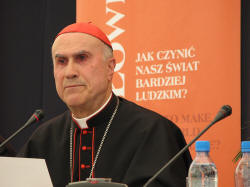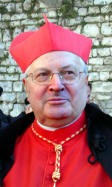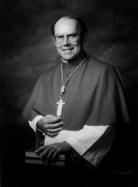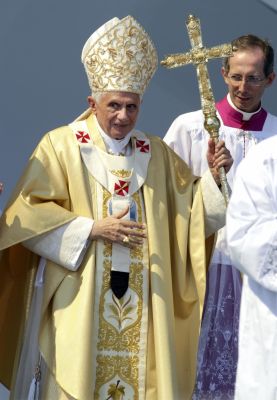|

by Laurie Goodstein
Marlise Simons contributed reporting
from Paris and Rachel Donadio from Rome
September 13, 2011
from
NewYorkTimes Website
Human rights lawyers and victims of clergy sexual abuse said they
would file a complaint on Tuesday urging the
International Criminal Court (ICC) in The
Hague to investigate and prosecute Pope
Benedict XVI and three top
Vatican officials for crimes against humanity for what they
described as abetting and covering up the rape and sexual assault of
children by priests.
The formal filing of nearly 80 pages by two American advocacy
groups,
...marks the most substantive effort yet
to hold the pope and the Vatican accountable in an international
court for sexual abuse by priests.
A spokesperson at the court said that the prosecutor’s office will
examine the papers,
“as we do with all such
communications.”
The first step will be, “to analyze
whether the alleged crimes fall under the court’s jurisdiction,”
Florence Olara, the prosecutor’s spokeswoman said.
Complaints about
the Vatican and child abuse by Catholic priests have been
received at the court before, court records showed. But Ms. Olara
said that details are not normally disclosed by the court unless a
case goes forward.
Lawyers familiar with the I.C.C. said that it was unlikely that
complaint against the Vatican would fit the court’s mandate to
prosecute war crimes, crimes against humanity and genocide. But even
an examination of the issue by the prosecution office would appear
to serve the plaintiffs’ goal of getting international attention for
the case.
A Vatican spokesman was not immediately available for comment.
Vatican officials have often said that the decisions about priests
accused of abuse are made by bishops - not by the Vatican hierarchy
- and that the church is far more decentralized than is widely
believed.
But the lawyers and abuse victims who are taking the case to the
international court say their action is necessary because all the
cases brought against priests and bishops in various countries have
not been sufficient to prevent the crimes from continuing.
“National jurisdictions can’t really
get their arms around this,” said Pamela Spees, a lawyer with
the Center for Constitutional Rights, who helped prepare the
filing.
“Prosecuting individual instances of
child molestation or sexual assault has not gotten at the larger
systemic problem here. Accountability is the goal, and the I.C.C.
makes the most sense, given that it’s a global problem.”
In addition to Pope Benedict XVI, the
filing asks the court to prosecute,
|
 |
 |
 |
|
Tarcisio
Bertone |
Angelo
Sodano |
William
Levada |
A central question is whether the
accusations will fit the court’s criteria.
The International Criminal Court has
jurisdiction over war crimes, crimes against humanity and genocide
committed after July 1, 2002, when the court opened. It is
independent of
the United Nations and has
jurisdiction in the 117 countries that so far have ratified the Rome
Statute that created the court.
The filing against the Vatican cites
five cases in which priests have been accused of abuse in the
Democratic Republic of the Congo and the United States; the priests
in these cases are from,
-
Belgium
-
India
-
the United States
Ms. Spees said she hoped to
convince the court that the cases were within its jurisdiction,
because they involve abuses that she said were “systematic and
widespread,” and because the pope and two of the three cardinals
named in the filing are from nations that are signatories to the
Rome Statute.
Experts in international law said they thought the court’s chief
prosecutor, Luis Moreno-Ocampo, would be reluctant to accept
the cases because of thorny jurisdictional questions, as well as
political and religious sensitivities.
They said that the sexual abuse of minors by Roman Catholic priests
was sufficiently heinous and numerous to meet the court’s standards.
The question is whether the facts show that the Vatican officials
actually perpetuated the abuse.
Mark Ellis, executive director of the
International Bar Association,
which is based in London, said he thought that the Court would open
a preliminary investigation to determine whether it has jurisdiction
- and that it would probably conclude that it did not.
“Crimes against humanity means acts
that are committed as part of a widespread or systematic attack
directed against a civilian population,” Mr. Ellis said.
“What you’re looking at is really a
policy, in which the government or the authorities are planning
the attack.”
“When you look at the concept of why and how the I.C.C. was
created, I just don’t think this fits,” he said.
“But the filing does something
that’s important. It raises awareness. Ultimately the plaintiffs
will elevate this in the public eye and it will force the court
to respond.”
Abuse Victims Seek International Court Case...
Against Pope
by Mike Corder and Rachel Zoll
The Associated Press
September 13, 2011
from
NewsDay Website
|
Corder reported
from The Hague. Zoll reported from New York. Associated
Press writer Nicole Winfield contributed to this report
from Rome. |

Pope Benedict XVI,
flanked by bishop Pietro Marini, Master of Liturgical Celebration
walks at the end of a
Holy Mass in Ancona' s shipyard,
on the shores of the
Adriatic Sea, Sunday, Sept. 11, 2011.
Pope Benedict XVI
prayed for the victims of the Sept. 11 terror attacks
and called on world
leaders and others to resist what he calls
the "temptation
toward hatred."
(AP Photo/Pier Paolo
Cito)
THE HAGUE, Netherlands - (AP)
Clergy sex abuse victims upset that no
high-ranking Roman Catholic leaders have been prosecuted for
sheltering guilty priests brought their claims Tuesday to the
International Criminal Court, seeking an investigation of the pope
and top Vatican cardinals for possible crimes against humanity.
The
Center for Constitutional Rights, a
New York-based nonprofit legal group, requested the inquiry on
behalf of the Survivors Network of those Abused by Priests, arguing
that the global church has maintained a "long-standing and pervasive
system of sexual violence" despite promises to swiftly oust
predators.
The Vatican said it had no immediate comment.
The odds against the court opening an investigation are enormous.
The prosecutor has received nearly 9,000 independent proposals for
inquiries since 2002, when the court was created as the world's only
permanent war crimes tribunal, and has never opened a formal
investigation based solely on such a request.
Instead, prosecutor Luis Moreno-Ocampo has investigated
crimes such as genocide, murder, rape and conscripting child
soldiers in conflicts from Darfur to this year's violence in Libya.
Such cases have been referred to the
court by the countries where the atrocities were perpetrated or by
the United Nations Security Council.
Also, the Holy See is not a member state of the court,
meaning prosecutors have no automatic jurisdiction there, although
the complaint covers alleged abuse in countries around the world,
many of which do recognize the court's jurisdiction.
However, attorneys for the
Survivors Network
argued that no other national entity exists that will
prosecute high-level Vatican officials who failed to protect
children. In the U.S., no Roman Catholic bishop has been criminally
charged for keeping accused clergy in parish jobs without warning
parents or police.
Within the church, only the pope can
discipline bishops.
The few who have been publicly punished
by
the Vatican have been sanctioned
for molesting children, not for negligence in supervising priests.
"When a church has been left to its
own devices it does nothing. It wouldn't even have the reforms
it has now if these cases hadn't begun to bubble up and erupt in
the public outside the confines of what the church can control,"
said Pam Spees, a Center for Constitutional Rights
attorney leading the case.
The complaint names,
-
Pope
Benedict XVI, partly in
his former role as leader of the Vatican's Congregation for
the Doctrine of the Faith, which in 2001 explicitly gained
responsibility for overseeing abuse cases
-
Cardinal William Levada, who now
leads that office
-
Cardinal Angelo Sodano, who was
the Vatican secretary of state under Pope John Paul II
-
Cardinal Tarcisio Bertone, who
now holds that post
Attorneys for the victims equate the
abuse with rape, sexual violence and torture that is considered a
crime against humanity as described in the international treaty that
spells out the court's mandate.
The complaint also accuses Vatican
officials of creating policies that perpetuated the damage,
constituting an attack against a civilian population.
The Survivors Network and victims are pursuing the case as the abuse
scandal, once dismissed as an American problem by the Vatican,
intensifies around the world. Thousands of people have come forward
in Ireland, Germany and elsewhere with reports of abusive priests,
bishops who covered up for them and Vatican officials who moved so
slowly to respond that molesters often stayed on the job for
decades.
Vatican officials and church leaders elsewhere have apologized
repeatedly, clarified or toughened church policies on ousting
abusers and, in the U.S. alone, paid out nearly $3 billion in
settlements to victims and removed hundreds of priests. Bishops
insist they fully grasp the devastation that molestation causes to
victims and the limits dioceses must impose on abusive clergy.
However, the scandal is far from resolved.
The Vatican is fighting on multiple legal fronts in the U.S. against
lawsuits alleging the Holy See is liable for abusive priests. Just
last month, the Vatican was forced to turn over internal personnel
files of an abusive priest to lawyers representing a victim in
Oregon.
Those prosecutions also could form an impediment to the ICC taking
the case. The tribunal is a court of last resort, meaning it will
only take cases where legal authorities elsewhere are unwilling or
unable to prosecute.
Also, the court doesn't investigate crimes that occurred before its
2002 creation.
A study commissioned by the U.S. bishops
from the
John Jay College of Criminal Justice
in New York found abuse claims had peaked in the 1970s, then began
declining sharply in 1985, as the bishops and society general gained
awareness of the problem.
|



